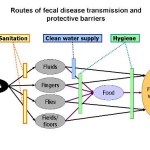sanitation
By Jay Graham
Global Handwashing Day is coming up on October 15, and events in its honor will be occurring all week. Children are a key focus of handwashing campaigns. Diarrhea continues as the second leading cause of death in kids under 5 years of age globally. Nearly one in every five child deaths, around 1.5 million a year, is due to diarrhea. It kills more children than AIDS, malaria, and measles combined - more than 4,000 children dying every day.
So, why Global Handwashing Day? Handwashing may be the single most cost-effective public health intervention ever. In a systematic review,…
Seven Republicans will meet tonight at St. Anselms college in Manchester, New Hampshire for a Presidential debate. The participants include both the declared candidates (Herman Cain, Newt Gingrich, Ron Paul, Tim Pawlenty, Mitt Romney, and Rick Santoroum) and likely candidate, Michele Bachman. Given that the event will take place in the St. Anselm Hawk's hockey venue, I'm going to keep a scorecard on the candidates' responses to issues affecting public health.
Since the breath of topics relevant to public health is wide, during tonight's debate I'll focus my attention on domestic policy…
Vaccines are a tried and true mechanism for controlling disease, but they are not always a magic bullet. Researchers who study the spread of cholera in Haiti recently modeled what would happen if 150,000 vaccines were administered in Port-au-Prince. They concluded "the benefits would have been negligible." Liz Borkowski writes, "this intervention's small effectiveness is due partly to the slow pace at which full immunity builds up and to the likelihood that many vaccine recipients would've already built up natural immunity." A better way to control a water-borne disease like cholera is…
I was delighted to be a guest on the Skeptically Speaking radio show/ podcast recently - I spoke with host Desiree Schell about why toilets (and other related forms of sanitation) are so great. In fact, the whole episode is dedicated to the topic of "Sewer Science," and also features University of York's Alistair Boxall discussing pharmaceutical contaminants. The previous episode focuses on municipal water systems and water fluoridation, and there are many other fascinating health-related episodes on the site available for downloading or online listening.
My past posts on sanitation in the…
Annual sales revenue in the nation's restaurant industry tops $515 billion, but few of the 10.3 million workers in the industry earn a living wage. Those are the findings released today of comprehensive surveys of working conditions for 1,700 restaurant workers employed in Washington DC, Miami and Los Angeles. To date, more than 4,300 workers have been interviewed in eight cities in a project coordinated by Restaurant Opportunities Center United.
In Miami and Los Angeles, 75% and 71% of the restaurant workers surveyed, respectively, have no health insurance; the figure was 48% for…
In Monday's post I mentioned how much I loved London when I visited - but London wasn't always such an appealing place. During the Industrial Revolution, it was filthy and polluted. The stench was appalling, and an episode of particularly foul smells from the Thames River in 1858 was known as the "Great Stink." Life expectancy in England's urban areas was markedly lower than in the countryside.
This filthy environment was the site of a public health breakthrough. During the 1854 cholera epidemic in London, the physician John Snow mapped the cholera cases from an outbreak in the Soho district…
Today is Blog Action Day, when bloggers around the world write about an important global topic. This year, the focus is on water.
According to the World Health Organization, each year 3.4 million people - most of them children - die from water-related diseases. That includes 1.4 million children dying from diarrhea annually, and 860,000 children perishing directly or indirectly from malnutrition arising from repeated diarrhea or intestinal nematodes. Many malnourished children do survive, but can suffer lifelong impairment. Other water-related diseases, like trachoma and schistosomiasis,…
I noted in my post about Pakistan that a shortage of clean water for millions of flood victims may lead to outbreaks of diarrheal diseases. It's worth getting into the issue of how unclean water causes these diseases. Basically, the problem is water contaminated by human feces.
In Clinical Microbiology Reviews, Qadri et al list the major agents behind the estimated annual toll of 1.5 million deaths from diarrheal disease: Enterotoxigenic Escherichia coli, or ETEC (the group of E. coli that produce toxins that cause diarrhea); Vibrio cholerae; Shigella; and rotavirus. These three bacteria and…

